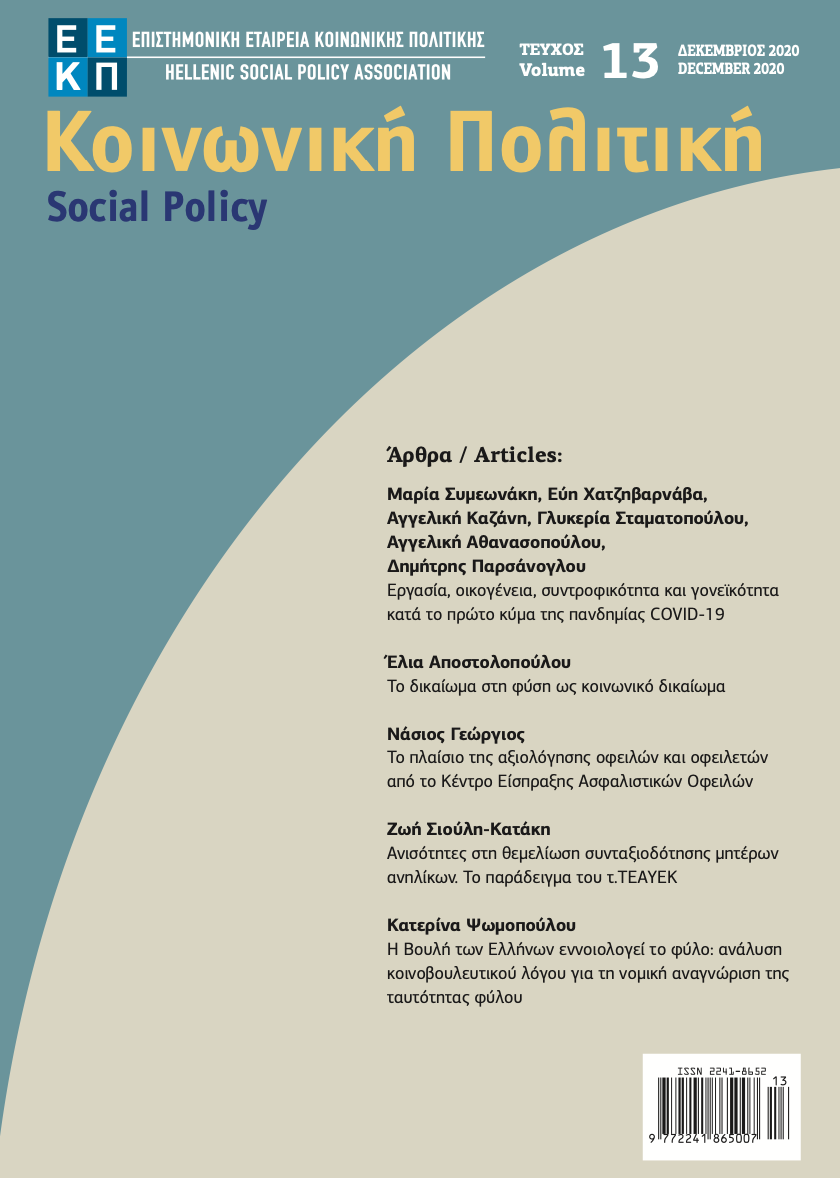Το δικαίωμα στη φύση ως κοινωνικό δικαίωμα
Аннотация
Η εξάπλωση ρεβανσιστικών νεοφιλελεύθερων πολιτικών τη δεκαετία που ακολούθησε το ξέσπα- σμα της παγκόσμιας οικονομικής κρίσης του 2008 είχε τεράστιες επιπτώσεις για τις σχέσεις κοινω- νίας-φύσης. Οι αλλαγές αυτές συνδέονται άρρηκτα με την ένταση της νεοφιλελευθεροποίησης της μη-ανθρώπινης φύσης και αποτελούν μέρος μίας συνολικότερης απορρύθμισης της περιβαλλο- ντικής και εργατικής νομοθεσίας, επιβολής πολιτικών λιτότητας και κατάρρευσης του λεγόμενου κράτους δικαίου. Στο παρόν άρθρο αναλύεται αφενός σε τι συνίσταται τόσο ο φιλελευθερισμός όσο και η νεοφιλελευθεροποίηση της φύσης και αφετέρου γιατί η ένταση της εκμετάλλευσης της φύσης σηματοδοτεί την απώλεια δικαιωμάτων για την κοινωνική πλειοψηφία. Το άρθρο προτάσ- σει την ανάγκη οι πολιτικές διατήρησης και προστασίας της φύσης να γίνουν ευρέως κατανοητές ως αναπόσπαστο κομμάτι της κοινωνικής πολιτικής και το δικαίωμα στη φύση ως ένα κοινωνικό δικαίωμα το οποίο προβλέπεται να βρεθεί στο επίκεντρο των κοινωνικών-περιβαλλοντικών κινη- μάτων και αγώνων στην εποχή του Ανθρωπόκαινου.
Article Details
- Как цитировать
-
Αποστολοπούλου Έ. (2021). Το δικαίωμα στη φύση ως κοινωνικό δικαίωμα. Κοινωνική Πολιτική, 13, 43–62. https://doi.org/10.12681/sp.29059
- Выпуск
- Том 13 (2020)
- Раздел
- Άρθρα

Это произведение доступно по лицензии Creative Commons «Attribution» («Атрибуция») 4.0 Всемирная.
Οι συγγραφείς των άρθρων που δημοσιεύονται στο περιοδικό διατηρούν τα δικαιώματα πνευματικής ιδιοκτησίας επί των άρθρων τους, δίνοντας στο περιοδικό το δικαίωμα της πρώτης δημοσίευσης. Άρθρα που δημοσιεύονται στο περιοδικό διατίθενται με άδεια Creative Commons 4.0 και σύμφωνα με την άδεια μπορούν να χρησιμοποιούνται ελεύθερα, με αναφορά στο/στη συγγραφέα και στην πρώτη δημοσίευση για μη κερδοσκοπικούς σκοπούς και με δικαίωμα τροποποίησης μόνον με παρόμοια διανομή (αν αναμείξετε, τροποποιήσετε, ή δημιουργήσετε πάνω στο υλικό, πρέπει να διανείμετε τις δικές σας συνεισφορές υπό την ίδια άδεια όπως και το πρωτότυπο).



